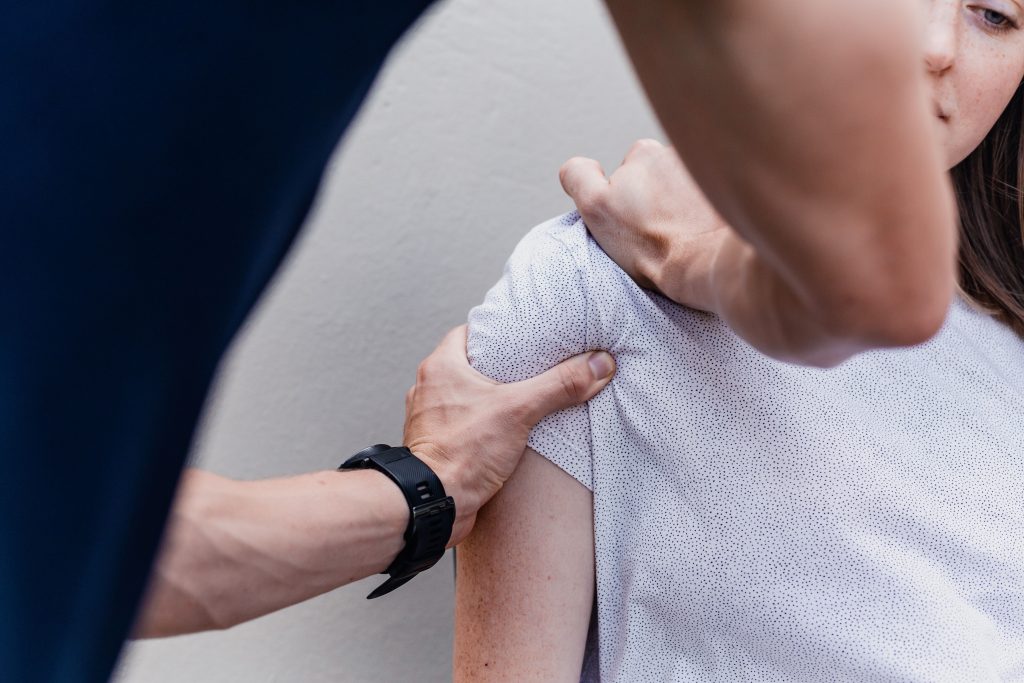Physiotherapist are trained to treat the muscular and skeletal system of the body. Through manual hands-on treatment combined with exercises at the appropriate level, your physiotherapist can help you get back to moving pain free and participating in the tasks and jobs you want to do.
Injuries are painful and can be debilitating. Physiotherapy is part of the medical system devoted to helping patients heal and recover from injury and illness. We do not use drugs or pharmaceuticals. We work in conjunction with your GP and specialist to make use of the benefits of pain relief and anti-inflammatory to get your through your rough patch and back on the road to recovery, and eventually a drug free living.
Your physiotherapist has skills ranging from soft tissue mobilization, joint mobilization, stretching, strengthening, postural alignment, dry needling, core stability and exercise prescription. Each physio is different in their own right and bring their life experience to the table to understand your injury and help you get better.
By working closely in a team with other physios as well as osteopaths, chiropractors, acupuncturists, massage therapists and physical trainers, your physio will work towards your recovery. If one physio does not have the skillset, another physio may look at your problem from a different viewpoint and that may get your that much closer to your full recovery and physical health.

Who is physiotherapy for?
- Anyone who has had an injury to the musculoskeletal system from sports, work or accident.
- Anyone who wants advice on exercises and posture.
- Anyone with back pain or neck pain.
- Anyone who needs rehabilitation after surgery.
- Anyone with recurring problems and chronic condition of the physical body.
What techniques are used?
- Deep massage.
- Trigger point therapy.
- Muscle mobilization.
- Joint mobilization.
- Muscle stretching techniques.
- Exercise therapy including core stability and stretching
- Neuromuscular techniques
- Mulligan mobilisation with movement
- Taping, bracing and supports.
- Injury prevention
Receiving physiotherapy will speed up your recovery by:
- Massaging tissues to assist their healing capability and mobilising.
- Stretching and mobilizing joints so that they are at their optimal functioning level.
- Helping you to retrain postural muscles that may be weakened and hindering your recovery.
- Helping you to retrain movement patterns that may be dysfunctional.
For BREATHING DISORDERS, we have Bradcliff certified physiotherapists for breathing pattern assessment and re-education, inspiratory muscle training for athletes, chronic respiratory illness, and a variety of health conditions.

We make use of modern high tech treatment modalities that have proved itself, no mumbo jumbo, blue goo, magic wand waving and hoping for the best. Any modality we use must have proved itself in improving patient outcomes or helping the “hopeless” cases.

- Get the right layer working! Transverse abdominus is the deepest layer of muscle in your body
- Ultrasound imaging will be used to teach you how to use your deepest and very important core muscle the transversus abdominus.
- We found many patient with back pain do not use it well or don’t use it at all. Or they may be overusing their obliques.
- This may happen after child birthing or surgeries, especially if there is trauma to the abdominal area.
- Using this we have also helped maximise performance in our elite athletes we support.

- Improve recovery from chronic tendon injuries especially Achilles tendons and calcific supraspinatus tendons.
- We are constantly discovering areas of benefit from using this modality
- Radial pressure waves offer a non-invasive treatment solution for long term insertion and soft tissue pathologies.
- Local treatment of the affected area will enhance and reset the healing pattern while reducing pain and improving function.
- With very few negative side effects, Radial Pressure Wave therapy is indicated for conditions that are normally very difficult to treat and is now widely used for many therapeutic and wellness applications.
- Physical effects of radial pressure waves include: pain reduction (Gate Control theory), increased metabolism, as shockwaves influence the tissues on a cellular level, revascularization effect, where the renewed blood flow promotes tissue healing and regeneration, and muscle tone recovery.
- https://www.chattanoogarehab.com/intelect-rpw-shockwave-2074-int

- Helping new acute injuries recover faster, alleviate pain
- Getting chronic injuries start to respond again.
- https://www.lzr7.com/
- https://www.lzr7.com/faqs/
If you have had an injury to joints or muscles, your physiotherapist will be assisting in your recovery.